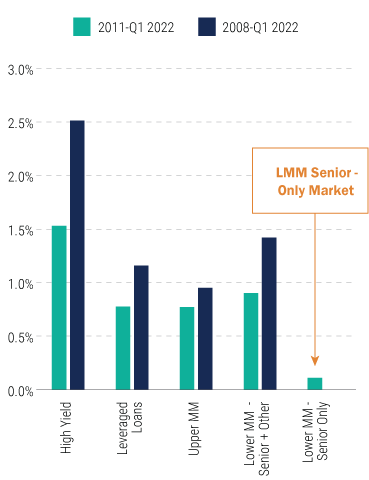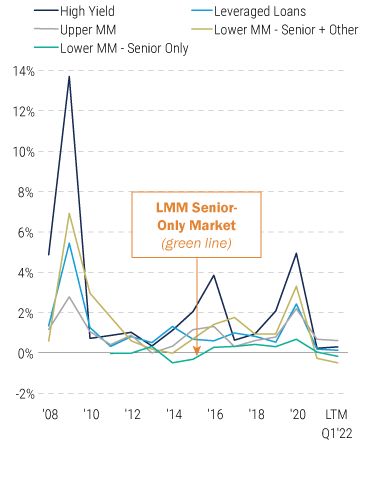Right from the Start: How Underwriting Should Work

Doug Lyons
Managing Director, Head of Origination

In private credit, how a transaction begins is just as important as how it finishes. Unlike fixed income instruments such as bonds, private credit is not typically traded in a secondary market, which means investors tend to hold them to maturity. This illiquidity factor makes pre-investment due diligence critical to investment outcomes.
In recent years, the rapid growth of the US private debt market has led to concerns of loosening underwriting standards as investors chased yields— that is, tight competition meant that some transactions may have closed quickly without adequate credit quality checks. We believe the lower middle market provides a strong risk-adjusted return relative to other parts of the middle market and public markets, however when the borrowing company’s earnings become challenged, these transactions could potentially unravel badly for investors.
Lower overall loss ratio historically across lower middle market (LMM Senior- Only below)
Relative to upper middle market and other public credit asset classes
Average Credit Loss by Asset Class as Represented by Indices*

Annual Credit Loss by Asset Class as Represented by Indices*

*As of LTM 31 March 2022. Source: PineBridge with underlying data source from Cliffwater Direct Lending Index, ICE BofAML High Yield index, Credit Suisse Leveraged Loan Index and Fitch for Upper MM. High Yield data source: ICE BofA High Yield index. Leveraged Loans data source: Credit Suisse Leveraged Loan Index. Upper MM data source: Fitch. Lower MM Senior + Other data source: Cliffwater Direct Lending Index (CDLI). LMM Senior Only source: Cliffwater Direct Lending Index- Senior Only (CDLI-S). For illustrative purposes only. We are not soliciting or recommending any action based on this material. For more information on the financial indicators and benchmarks used above, please see the Appendix - Financial Indicators & Benchmarks.
Disciplined due diligence
We believe a highly disciplined and consistent approach in underwriting is imperative at any point in the market cycle, and that this serves as a key driver of performance.
A disciplined credit underwriting process requires deep due diligence checks reasonably designed to help make the most-informed investment decisions that aim to protect investors’ capital and deliver their targeted returns. When screening potential transactions, it is important to be selective on loan size, sponsorship, quality, and our ability to affect change in the company. The due diligence process starts with a thorough understanding of a company’s background — ownership, competitors and market share, sales and marketing, employees, credit history, customer and supplier concentration, management team, and other metrics. We believe the next step should be a comprehensive financial analysis into cash flow, the durability of earnings, and test the company’s ability to meet its financial obligations in various scenarios - including in periods of high inflation and rate hikes that we have today. For instance, how will a company maneuver through rapidly changing conditions for their industry? Does the company have room to pass on increasing costs to its customers without eroding market share? At the same time, the underwriter should also investigate potential industry regulations and legal issues that may arise over the duration of the loan that could impact the company’s operations and earnings capability. In our experience, nonfinancial material risk assessments cannot be underestimated.
The value of sponsor quality
Finding compelling opportunities in private debt relies on long-term relationships with sponsors or private equity companies who own shares in companies seeking financing. The financial support and commitment of the sponsor acts as a first line of defense for the lender in periods of earnings pressure, helping to mitigate credit risks and preserve capital. As such, the quality of the sponsor is key to investment outcomes.
We believe focusing on senior secured first lien loans builds in another layer of downside risk cushion for investors and creates a baseline workaround scenario in the event of credit deterioration.
When the macro environment is as strained as it is today and could potentially lead to an uptick in defaults, investors interested in tapping the advantages of US private credit may find greater confidence working with managers that put risk management front and center, at all times, and with a seasoned team with portfolio management skills and a robust relationship network to effectively navigate market cycles.
Disclosure
Investing involves risk, including possible loss of principal. The information presented herein is for illustrative purposes only and should not be considered reflective of any particular security, strategy, or investment product. It represents a general assessment of the markets at a specific time and is not a guarantee of future performance results or market movement. This material does not constitute investment, financial, legal, tax, or other advice; investment research or a product of any research department; an offer to sell, or the solicitation of an offer to purchase any security or interest in a fund; or a recommendation for any investment product or strategy. PineBridge Investments is not soliciting or recommending any action based on information in this document. Any opinions, projections, or forward-looking statements expressed herein are solely those of the author, may differ from the views or opinions expressed by other areas of PineBridge Investments, and are only for general informational purposes as of the date indicated. Views may be based on third-party data that has not been independently verified. PineBridge Investments does not approve of or endorse any republication of this material. You are solely responsible for deciding whether any investment product or strategy is appropriate for you based upon your investment goals, financial situation and tolerance for risk.

